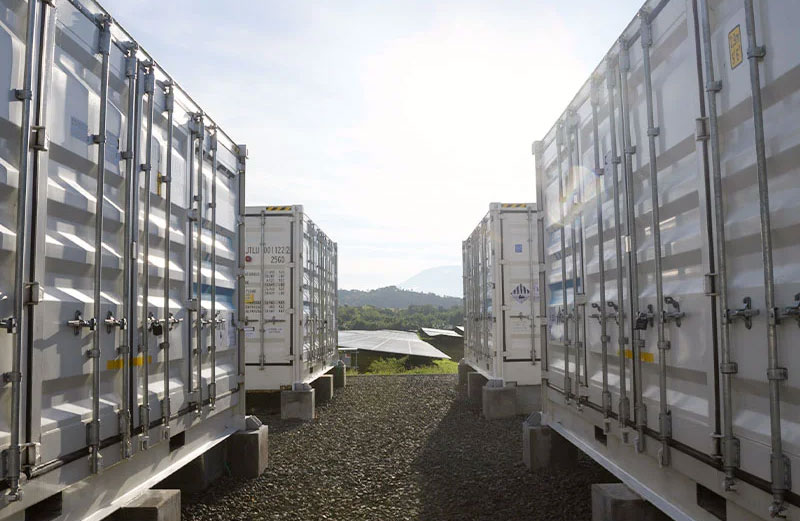Renewable energy offers more than just environmental benefits—it has a direct and transformative impact on communities. From reducing carbon emissions to creating green jobs for local communities, the benefits of renewable energy are far-reaching.
5 Benefits of renewable energy to communities
What are the benefits of renewable energy? Beyond its good environmental impact, renewable energy projects deliver positive outcomes that directly enhance the quality of life in communities.
1. Clean energy for healthier communities
Renewable energy reduces the negative environmental impacts of traditional fossil fuels such as coal by avoiding significant carbon emissions, resulting in a healthier living environment for communities. Fossil fuel-based power plants emit harmful pollutants like carbon dioxide, sulfur dioxide, nitrogen oxides, and particulate matter, which contribute to respiratory illnesses, cardiovascular diseases, and premature deaths.
In contrast, solar and wind power generate energy without these harmful emissions. For example, the 54 MW Guimaras Wind farm powers thousands of homes and reduces the need for thermal energy, improving air quality and public health for the residents of Guimaras and neighboring provinces.
Additionally, focusing on affordable and clean energy sustainable development goals ensures that renewable energy benefits extend beyond emission reductions. For instance, in Ilocos Norte, the 81 MW North Luzon Renewables wind farm project not only generates clean energy but also integrates biodiversity conservation efforts. By planting over 500,000 trees within the wind farm’s Conservation Estate, this project not only generates clean energy but also protects biodiversity.

2. Economic empowerment and job creation
Renewable energy projects create economic opportunities for local communities, offering green jobs, business growth, and skills development. Renewable energy infrastructure, particularly solar and wind farms, requires a substantial workforce for both construction and ongoing operations.
Moreover, ACEN’s agrivoltaics initiative across its solar farms in the Philippines creates dual benefits by combining renewable energy and agriculture. “Solar Gulayan” integrates solar power generation with crop cultivation under solar panels, offering local farmers improved agricultural productivity and additional income streams. This innovative method not only supports renewable energy goals but also strengthens the livelihoods of farmers, making it a sustainable solution for both energy and food production.
Through these projects, renewable energy not only powers homes and businesses but also acts as a catalyst for local economic empowerment, helping to create sustainable communities that thrive alongside clean energy infrastructure
3. Reliable and affordable energy supply
Another key benefit of using renewable energy is the ability to provide a stable, reliable, and affordable energy supply. Unlike fossil fuels, which are subject to price volatility and global market disruptions, renewable energy harnesses abundant natural resources—like sunlight and wind—that are available locally and at a lower cost.
By reducing the reliance on imported fossil fuels, renewable energy helps insulate communities from energy price fluctuations, providing them with a more affordable energy supply. Furthermore, investments in energy storage technology, such as the battery energy storage system in Alaminos, ensure that the benefits of renewable energy are available even during periods of low sunlight or wind.

4. Supporting climate resilience and sustainability
The shift to sustainable energy goes beyond energy generation—it actively supports climate resilience through projects that reduce carbon footprints and enhance local ecosystems. For instance, the Conservation Estate in Ilocos Norte combines reforestation with agroforestry, boosting biodiversity while reducing carbon dioxide emissions from the atmosphere.
Furthermore, renewable energy projects in the Philippines help transition communities away from reliance on fossil fuels, reducing their dependence on environmentally harmful energy sources. This approach strengthens both environmental protection and community stability, making renewable energy a vital tool for long-term sustainability.
As part of its broader sustainability goals, ACEN aims to achieve Net Zero by 2050, aligning its projects with global efforts to combat climate change. Through innovative renewable energy benefits, ACEN is paving the way for communities to become better prepared to handle environmental challenges.
5. Strengthening community engagement and collaboration
Renewable energy projects are built on strong partnerships with local communities, developing collaboration and engagement throughout the project lifecycle. Inclusivity ensures stakeholders are involved from the earliest stages of project development, creating a sense of ownership and shared responsibility.
The Solar Gulayan initiative, for example, works closely with local farming cooperatives to integrate the benefits of using renewable energy into solar farms. This program not only enhances food security but also empowers local farmers by providing training and resources for sustainable farming practices.
By prioritizing community engagement, renewable energy companies like ACEN ensure local stakeholders are active participants in the sustainability journey and can maximize the shared benefits of renewable energy.

Shaping communities through renewable energy
The transition to renewable energy offers significant advantages for communities. As renewable energy continues to evolve, ACEN remains at the forefront of innovation, investing in developing more renewable energy projects not only to address the region’s growing energy needs but also to create lasting benefits to communities.
With a strong focus on economic development, environmental stewardship, and community engagement, the Philippines is closer to building a future where renewable energy benefits everyone.
References:
- NIEHS. (2024, August 6). Air Pollution and Your Health. National Institute of Environmental Health Sciences. https://www.niehs.nih.gov/health/topics/agents/air-pollution
- United Nations. (n.d.). Renewable energy – powering a safer future. United Nations. https://www.un.org/en/climatechange/raising-ambition/renewable-energy

